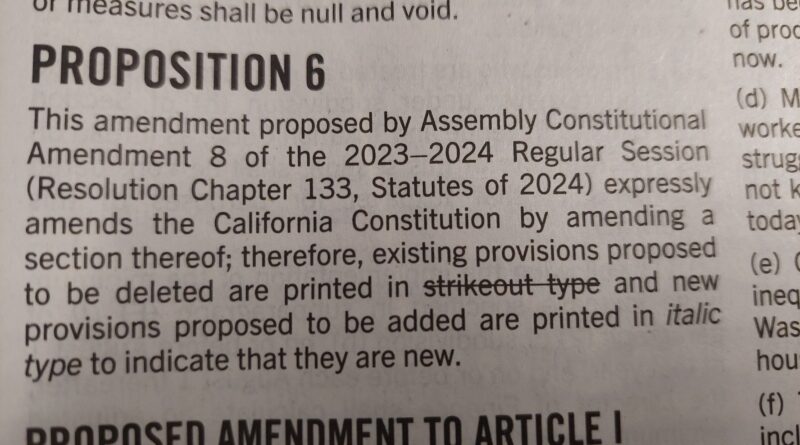Prop 6: Abolishment of modern day slavery
A monumental event occurred on Dec. 6, 1865, when Congress passed the 13th Amendment, ending the over 400-year legacy of slavery. However, this amendment had a loophole where people could be subjected to slavery if they were incarcerated, leading to the exploitation of prisoners.
Prop. 6 would modify the California Constitution so that jails and prisons would not be able to force prisoners into involuntary servitude. Prop. 6 claims to reinstate the dignity of prisoners and reform the focus of prison to rehabilitation. In the official voter submission, no argument was submitted against Prop 6.
Prop. 6 presents the stance that incarcerated individuals should strive on a path of rehabilitation and should maintain rights and dignity as fundamental parts of humanity.
“I think it’s a good start to reforming the prison system and helping prisoners themselves getting help. I support it because it’s a good start for the prison system to become more human and less of an institution to break someone,” said junior Renn Jory.
According to supporters of Prop. 6, prisoners currently are required to work which includes activities of cleaning, cooking, and other tasks that benefit prisons. About one-third of prisoners work, and the repercussions of refusing to work can strip away privileges that prisoners receive such as phone calls. However, prisoners are typically paid less than one dollar an hour for the work they do.
More than half of states have amended their state laws to close the 13th Amendment loophole of slavery and have demonstrated major voter support. In states like Alabama, Utah, Tennessee, and Vermont, over three-quarters of voters voted to do so. States like Colorado, Nebraska, and Oregon received support from over half of voters. California is one of the 16 states that still allow this loophole in the 13th Amendment.
“We (California) are one of the 16 states that do it so it would be easier if the whole of the US did it to make it fair. If we are the United States, we should be united,” said junior Mateo Piscil. Michelle Lew, an English teacher at CVHS for the past 20 years, presents a similar perspective on this proposition: “I am for it ideologically, for humanitarian rights, but the issue is so complex. It almost seems performative without a strong rehabilitation program that is well thought out and action-oriented,” she said.

